Related Research Articles
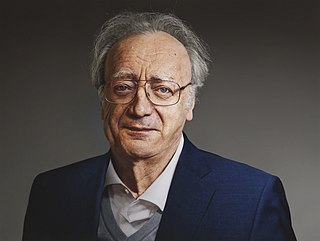
Alfred Brendel is a Czech-born Austrian classical pianist, poet, author, composer, and lecturer who is noted for his performances of Mozart, Schubert and Beethoven.

Sviatoslav Teofilovich Richter was a Soviet and Russian classical pianist. He is regarded as one of the greatest pianists of all time, and has been praised for the "depth of his interpretations, his virtuoso technique, and his vast repertoire".

Constantin "Dinu" Lipatti was a Romanian classical pianist and composer whose career was cut short by his death from effects related to Hodgkin's disease at age 33. He was elected posthumously to the Romanian Academy. He composed few works, all of which demonstrated a strong influence from Hungarian composer Béla Bartok.
Emil Grigoryevich Gilels was a Soviet pianist. He is widely regarded as one of the greatest pianists of all time.

Murray David Perahia is an American pianist and conductor. He has been considered one of the greatest living pianists. He was the first North American pianist to win the Leeds International Piano Competition, in 1972. Known as a leading interpreter of Bach, Handel, Scarlatti, Mozart, Beethoven, and Schumann, among other composers, Perahia has won numerous awards, including three Grammy Awards from a total of 18 nominations, and 9 Gramophone Awards in addition to its first and only "Piano Award".
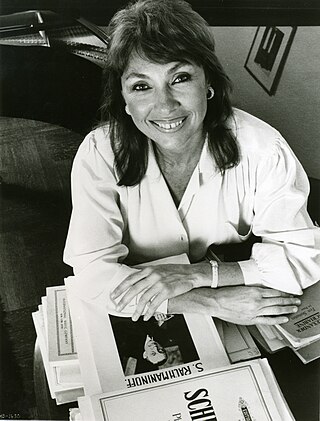
Ruth Laredo was an American classical pianist.

Alexis Sigismund Weissenberg was a Bulgarian-born French pianist.

Robert Nathaniel Mann was a violinist, composer, conductor, and founding member of the Juilliard String Quartet, as well as a faculty member at the Manhattan School of Music. Mann, the first violinist at Juilliard, served on the school's string quartet for over fifty years until his retirement in 1997.

Sir Stephen Andrew Gill Hough is a British-born classical pianist, composer and writer. He became an Australian citizen in 2005 and thus has dual nationality.
Joel Krosnick is an American cellist who has performed as a soloist, recitalist, and chamber musician throughout the world for over 40 years. As a member of the Juilliard String Quartet from 1974 to 2016, he performed the great quartet literature throughout North America, Europe, Asia, and Australia.
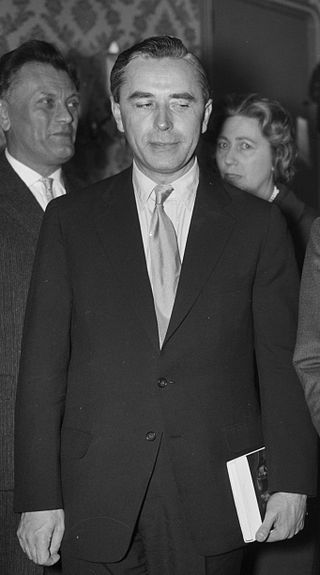
Rudolf Firkušný was a Moravian-born, Moravian-American classical pianist.
James Zuill Bailey, better known as Zuill Bailey is an American Grammy Award-winning cello soloist, chamber musician, and artistic director. A graduate of the Peabody Institute of the Johns Hopkins University and the Juilliard School, he has appeared in recital and with major orchestras internationally. He is a professor of cello and Director of the Center for Entrepreneurship at the University of Texas at El Paso. Bailey’s extensive recording catalogue are released on TELARC, Avie, Steinway and Sons, Octave, Delos, Albany, Sono Luminus, Naxos, Azica, Concord, EuroArts, ASV, Oxingale and Zenph Studios.

Emanuel "Manny"Ax is a Grammy-winning American classical pianist. He is known for his chamber music collaborations with cellist Yo-Yo Ma and violinists Isaac Stern and Young Uck Kim, as well as his piano recitals and performances with major orchestras in the world.

Radu Lupu was a Romanian pianist. He was widely recognized as one of the greatest pianists of his time.
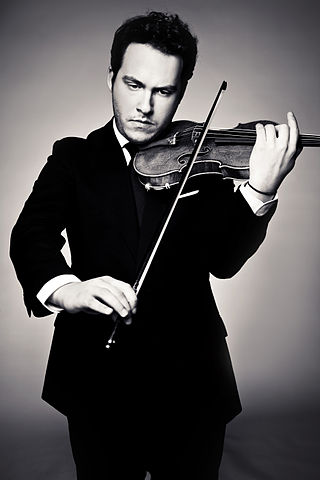
Giora Schmidt is an American/Israeli violinist.
Peng-Peng Gong, formerly known as his stage name Peng Peng, is a Chinese classical composer and pianist born on July 3, 1992. Described by The Washington Post as an artist "with the confidence of a weathered veteran and a welcome unbridled quality to his playing", he has established himself as one of the most gifted young artists of his generation. At 18, he has become an internationally active concert pianist and a six-time American Society of Composers, Authors and Publishers National Award-winning composer in consecutive years since 2006. He was among the youngest pianists to be officially signed to the artist roster of the renowned Opus 3 Artists in 2007 at age 14, and the youngest composer to be signed by the [Lauren Keiser Music Publishing] in 2009 at age 16. Since 2005, he concertized and toured intensely in the North America, South America, Europe, and China, appearing in over a hundred solo and orchestral engagements. He was invited twice, on personal request, by House Speaker Nancy Pelosi to perform for the United States Congress.
Robert Taub is a concert pianist, recording artist, scholar, author, and entrepreneur.

David Ezra Okonşar is a Turkish–Belgian pianist, composer, conductor, writer, and educator. He was previously known as "Mehmet Okonşar".

Conrad Yiwen Tao is an American composer and pianist and former violinist. Tao's piano and violin performances since childhood brought him early recognition at music festivals and competitions. At age 13, he was featured on the PBS TV series From the Top – Live from Carnegie Hall as violinist, pianist and composer. He won eight consecutive ASCAP Morton Gould Young Composer Awards. Among his compositions have been commissions by the New York Philharmonic, Hong Kong Philharmonic, Pacific Symphony and Dallas Symphony Orchestra.
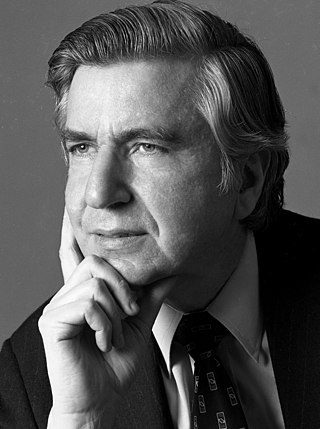
Martin Canin was an American pianist and prominent piano pedagogue who was on the faculty of The Juilliard School from 1976 to 2016 and of Stony Brook University from 1965 to 1993.
References
- 1 2 John Rockwell (September 22, 1984). "PIANO: DeGaetano in Recital". New York Times. Retrieved 13 February 2015.
- 1 2 "Alumni News for October 2013". Juilliard Alumni News. The Juilliard School. Retrieved 13 February 2015.
- 1 2 3 4 "Robert DeGaetano Bio". Robert DeGaetano. n.d. Retrieved 13 February 2015.
- ↑ Julie Amacher (Mar 9, 2010). "An Interview with Robert DeGaetano on Samuel Barber". Minnesota Public radio MPR. Retrieved 13 February 2015.
And that was the first time that I had been inspired to compose, because one night after dinner he said, "Why don't you write a song?"
- 1 2 3 Marc Shulgold (December 16, 1987). "Pianist Turns His Passion To Composing". Chicago Tribune. Scripps Howard News Service. Retrieved 13 February 2015.
- ↑ Tim Page (June 12, 1986). "Recital: DeGaetano, Piano". New York Times. Retrieved 13 February 2015.
- ↑ ALLAN KOZINN (January 31, 1995). "IN PERFORMANCE; CLASSICAL MUSIC". New York Times. Retrieved 16 February 2015.
The best of the eight works he offered was "The Challenger,"
- ↑ Ray Ragosta (October 25, 2010). "Pianist Robert DeGaetano to mark the anniversaries of Chopin, Schumann and Barber, Nov. 7". Rhode Island College News. Retrieved 13 February 2015.
Early pianos had wooden frames that couldn't stand up to aggressive playing. Pianists had to take care not to break strings or even the frame itself. But as the instruments got stronger, they could accommodate the great physical players like Liszt. For contemporary music, pianos need to have even greater resonance to go along with the louder and bigger sounds of our culture, like traffic noises.